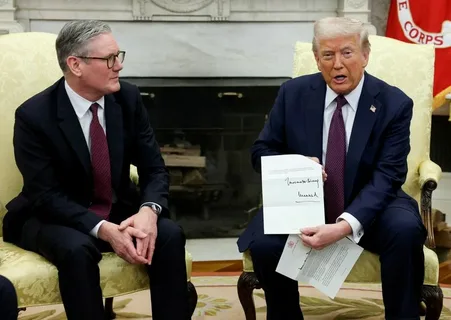The US-UK trade agreement promised on 8 May 2025 by US President Donald Trump represents a milestone in world history for international trade and diplomacy. Called an “all-encompassing” deal, the agreement marks the first big international trade treaty introduced by Trump following sweeping policies of tariffs introduced by him last month. The announcement—made via social media and followed up in an Oval Office press conference—marks a new era of US-UK trade agreement and economic relations and is being hailed as a model for future models of trade all over the world.
Trump touted the deal as “comprehensive and exhaustive,” confirming the long-standing relationship between the two countries and declaring it will bring about firmer economic relations for years to come. His counterpart in the United Kingdom, Prime Minister Keir Starmer, echoed the same sentiment. According to him, this deal would be very advantageous for British businesses concerning steel and automobiles.
According to officials US-UK trade agreement on both sides, this deal is just a launch pad, as several other countries are already in advanced negotiations to propose similar terms.
US-UK Trade Deal: Important Components
Even though the entire legal document has not yet been published, important details of the agreement have been made known by US and UK officials and US-UK trade agreement. It contains lower tariffs for certain products, particularly UK steel and automobiles, which had hitherto been charged a 25% tariff by Trump’s “Liberation Day” economic program. In a mutual gesture, the UK has pledged to reduce tariffs on US cars and revisit its digital services tax that has affected large US tech companies such as Amazon, Apple, and Google.
Significantly, this agreement has maintained the UK’s existing food safety and environmental standards, an insistence of the British government. This is considered as a pragmatic compromise where it provides economic relief and fosters trade growth while being deferential to domestic policies on either side.
Additionally, the agreement comes during a 90-day tariff pause declared by the Trump administration. This pause is part of a broader strategy aimed at encouraging key partners to negotiate new trade frameworks before harsher tariffs return.
Political Strategy and Economic Impact
The timing of this deal is significant. As the International Monetary Fund (IMF) reduced its world growth forecast on account of rising trade tensions and tariff wars, this deal is being seen as a stabilizing factor. Trump’s overall trade policy consists of a blanket 10% import tariff and a tough 145% duty on Chinese imports—steps that have alarmed many allies and world markets.
Analysts believe that US-UK trade agreement will see some breathing room, which might cushion the effects facing such industries. For Britain, especially post-Brexit, it would come as much-needed global economic positioning. Most importantly, freer flows of US goods into Britain will see both countries’ exporters gaining momentum.
Yet, experts are wary. Some say that although the agreement is symbolically important, US-UK trade agreement economic benefits in the near term will be limited, especially with larger tariffs still in effect. True gains will hinge on how soon the agreement is ratified and whether the terms of the agreement can be implemented smoothly across industries.
What This Means for Future Trade Talks
This agreement will likely pave the way for the same with other countries that wish to gain tariff relief from Trump’s actions. The US administration has shown ongoing negotiations with a number of countries, including Germany, India, and even China, where the situation is still fragile but ongoing.
Trump has openly stated that the present tariff hold of 90 days will not be renewed unless substantial progress is achieved. Nations that are unwilling to negotiate fairly can expect tariffs to be resuscitated, which could even be higher than before.
As such, this US-UK trade agreement isn’t just a bilateral win—it’s a strategic blueprint for how other nations might successfully renegotiate their trade relationships with the United States during this new era of protectionist policy.
A Symbol of Cooperation in Uncertain Times
The US-UK trade agreement, even before it is fully published and implemented, is a strong message: allies can agree even in stormy economic times. For Trump and Starmer alike, this is a political and diplomatic win. For consumers and companies, it provides guarded hope that cooperation—not confrontation—can take global trade forward.
For More Trending Business News, Follow Us 10xtimes News






